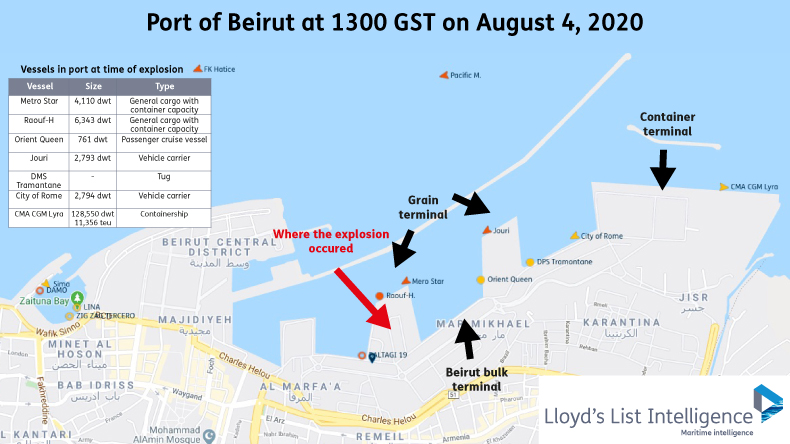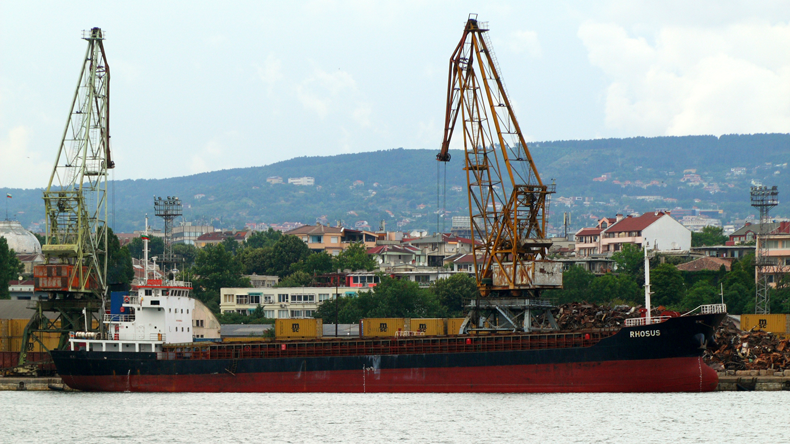Stored ammonium nitrate cargo link to Beirut blast
Two huge explosions in the port area of Beirut, Lebanon, have killed at least 100 people and wounded more than 4,000
Some 2,750 tonnes of ammonium nitrate were warehoused inside the perimeters of Beirut's port after being confiscated from a Moldova-flagged bulk carrier in 2013
A SEVEN-year-old consignment of ammonium nitrate stored in a warehouse at the port of Beirut is emerging as the likely cause of a huge explosion that rocked the Lebanese capital and killed at least 100 people.
The cargo is thought to have emanated from Moldova-flagged bulk carrier Rhosus in 2013, which was forced to divert to Beirut after developing technical problems while en route from Batumi in Georgia to Beira in Mozambique.
A number of Beirut port officials are being placed under house arrest pending an investigation into Tuesday’s huge explosion, Lebanon's government has said. House arrest would apply for all port officials “who have handled the affairs of storing [the] ammonium nitrate, guarding it and handling its paperwork” since June 2014, Information Minister Manal Abdel Samad said.
The International Transport Workers’ Federation has confirmed to Lloyd’s List its involvement in the case after the ship was subsequently detained by port state control, at which point it was abandoned after the charterer and cargo interests lost interest in the consignment of ammonium nitrate.
According to ITF records, it took a year to secure repatriation of the crew to their native Ukraine, after the owner claimed that the cargo owner disappeared, along with the cargo documents.
The sticking point appears to have been the reluctance of the port authority to allow the ship to be unattended, which meant that they were unwilling to allow the crew to leave without replacement.
The ship was arrested by the agent and the port authority for unpaid bills in the order of $100,000. Meanwhile, the ITF engaged a lawyer to secure back pay and permission to leave for the crew. This was granted in September 2014, with the owner paying the airfare home.
Crucially, the ITF’s records also suggest that Lebanon’s ministry was aware of developments, after the ITF contacted it to invite its intervention.

Lloyd’s List Intelligence records show that Rhosus (pictured below) was seized in February 2014 on account of unpaid bunkers. It sank in the breakwater in February 2018.
At some point between the detention and the sinking, some 2,750 tonnes of ammonium nitrate — an industrial chemical widely used in the manufacture of fertiliser and of both commercial and illicit explosives — were warehoused inside the perimeters of the port.
Ammonium nitrate is used for fertiliser as a good source of nitrogen for plants. It is also a key component in industrial explosives used in mining.
It is not explosive by itself and requires another substance, such as oil, to become highly explosive.
There are unconfirmed reports that welding work in the proximity of the warehouse yesterday may have sparked the blast.
Meanwhile, marine insurers are gearing up for what is likely to prove one of the most expensive insured cargo and port infrastructure losses ever, on a scale at least as large as the one resulting from the explosion at the Chinese port of Tianjin in 2015.
Peregrine Storrs-Fox, risk management director at logistics insurer TT Club, said the Beirut incident was clearly shaping up as a major claim.
“There is a suggestion that this relates to ammonium nitrate, but until such time as that is confirmed, that is conjecture,” he said.
“The storage of dangerous goods, and the issues arising from that, is an issue for the whole of the supply chain industry. This will be a warning for those involved in carrying, handling and storage such cargoes, which needs to be done with the utmost care.”
While the size of claims cannot even begin to be estimated this early on, the whole port can be seen to be impacted from available video footage, and plenty of claims are certain to arise, he went on.
TT Club — one of the most important insurers of ports facilities — “may well” face exposure itself, Mr Storrs-Fox confirmed, and will of course pay out on insured claims.
If the ammonium nitrate was confiscated, it is unlikely itself to be insured. But the assumption is that cargo in adjacent warehouses will have been covered by cargo insurance.


